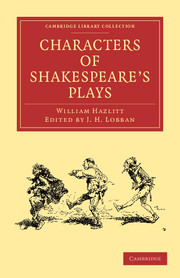Book contents
- Frontmatter
- Preface
- Contents
- Introduction
- Preface
- Cymbeline
- Macbeth
- Julius Cæsar
- Othello
- Timon of Athens
- Coriolanus
- Troilus and Cressida
- Antony and Cleopatra
- Hamlet
- The Tempest
- The Midsummer Night's Dream
- Romeo and Juliet
- Lear
- Richard II
- Henry IV
- Henry V
- Henry VI
- Richard III
- Henry VIII
- King John
- Twelfth Night; or, what you will
- The Two Gentlemen of Verona
- The Merchant of Venice
- The Winter's Tale
- All's Well That Ends Well
- Love's Labour's Lost
- Much Ado About Nothing
- As You Like It
- The Taming of the Shrew
- Measure for Measure
- The Merry Wives of Windsor
- The Comedy of Errors
- Doubtful plays of Shakespear
- Poems and Sonnets
- Notes
Richard II
Published online by Cambridge University Press: 07 September 2010
- Frontmatter
- Preface
- Contents
- Introduction
- Preface
- Cymbeline
- Macbeth
- Julius Cæsar
- Othello
- Timon of Athens
- Coriolanus
- Troilus and Cressida
- Antony and Cleopatra
- Hamlet
- The Tempest
- The Midsummer Night's Dream
- Romeo and Juliet
- Lear
- Richard II
- Henry IV
- Henry V
- Henry VI
- Richard III
- Henry VIII
- King John
- Twelfth Night; or, what you will
- The Two Gentlemen of Verona
- The Merchant of Venice
- The Winter's Tale
- All's Well That Ends Well
- Love's Labour's Lost
- Much Ado About Nothing
- As You Like It
- The Taming of the Shrew
- Measure for Measure
- The Merry Wives of Windsor
- The Comedy of Errors
- Doubtful plays of Shakespear
- Poems and Sonnets
- Notes
Summary
Richard II. is a play little known compared with Richard III. which last is a play that every unfledged candidate for theatrical fame chooses to strut and fret his hour upon the stage in; yet we confess that we prefer the nature and feeling of the one to the noise and bustle of the other; at least, as we are so often forced to see it acted. In Richard II. the weakness of the king leaves us leisure to take a greater interest in the misfortunes of the man. After the first act, in which the arbitrariness of his behaviour only proves his want of resolution, we see him staggering under the unlooked-for blows of fortune, bewailing his loss of kingly power, not preventing it, sinking under the aspiring genius of Bolingbroke, his authority trampled on, his hopes failing him, and his pride crushed and broken down under insults and injuries, which his own misconduct had provoked, but which he has not courage or manliness to-resent. The change of tone and behaviour in the two competitors for the throne according to their change of fortune, from the capricious sentence of banishment passed by Richard upon Bolingbroke, the suppliant offers and modest pretensions of the latter on his return to the high and haughty tone with which he accepts Richard's resignation of the crown after the loss of all his power, the use which he makes of the deposed king to grace his triumphal progress through the streets of London, and the final intimation of his wish for his death, which immediately finds a servile executioner, is marked throughout with complete effect and without the slightest appearance of effort.
- Type
- Chapter
- Information
- Characters of Shakespeare's Plays , pp. 137 - 143Publisher: Cambridge University PressPrint publication year: 2009First published in: 1908

